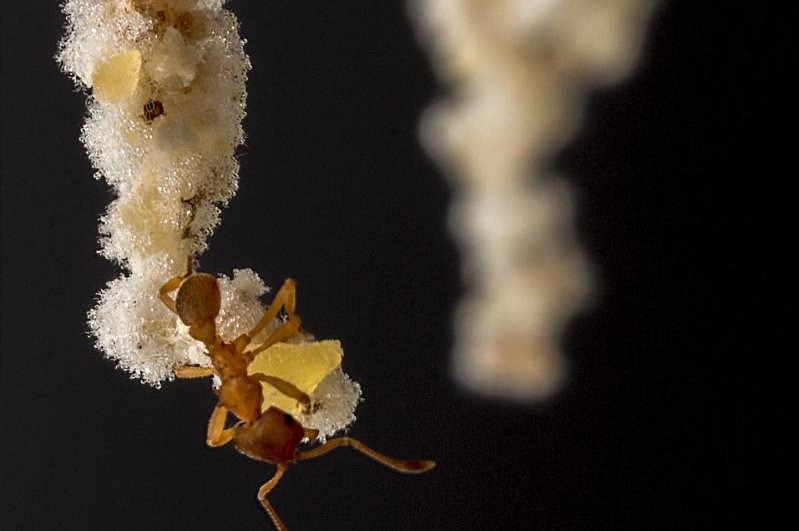A leaf-cutter ant climbs a strand of hyphae produced by colony's cultivated fungus. Photo by David Nash/STRI
PANAMA CITY, Panama, Sept. 2 (UPI) -- Ants have been farming longer than humans have, but as new research reveals, they still haven't domesticated their preferred crop -- fungus.
Not long after the dinosaurs disappeared, leaf-cutter ants gave up their hunting-and-gathering ways and decided to settle down. They kept gathering leaves, only no longer for eating. The leaves became fertilizer for small underground fungus farms.
Fast-forward 60 million years and modern leaf-cutter ants are still at it. The two species, the ant and the fungus, have become entirely reliant on each other for their continued existence.
When a new queen moves out to establish her own colony, she carries a piece of the fungus with her to plot a new garden.
"For this sort of tight mutual relationship to develop, the interests of the ants and the fungi have to be completely aligned, like when business partners agree on all the terms in a contract," Bill Wcislo, deputy director at the Smithsonian Tropical Research Institute, explained in a news release. "We found that the selfish interests of more primitive ancestors of leaf-cutting ants are still not in line with the selfish interests of their fungal partner, so complete domestication hasn't really happened yet."
To ensure their cultivated fungus produces more hyphae than mushrooms, ants manipulate the soil composition. Carbohydrate-rich soil carefully supplemented with protein ensures the fungus produces mostly hyphae, the root-like growth that nourishes the ants and their larvae.
Unfortunately, this strategy has the effect of limiting the fungus' productivity. A more productive growing strategy is still a long way off, researchers say.
"The parallels between ant fungus farming and human agriculture are uncanny," said Jonathan Shik, a post-doctoral fellow at the University of Copenhagen. "Human agriculture evolved in the past 10,000 years."
The farming strategy of modern leaf-cutter ants was detailed in new paper, published this week in the journal PNAS.















